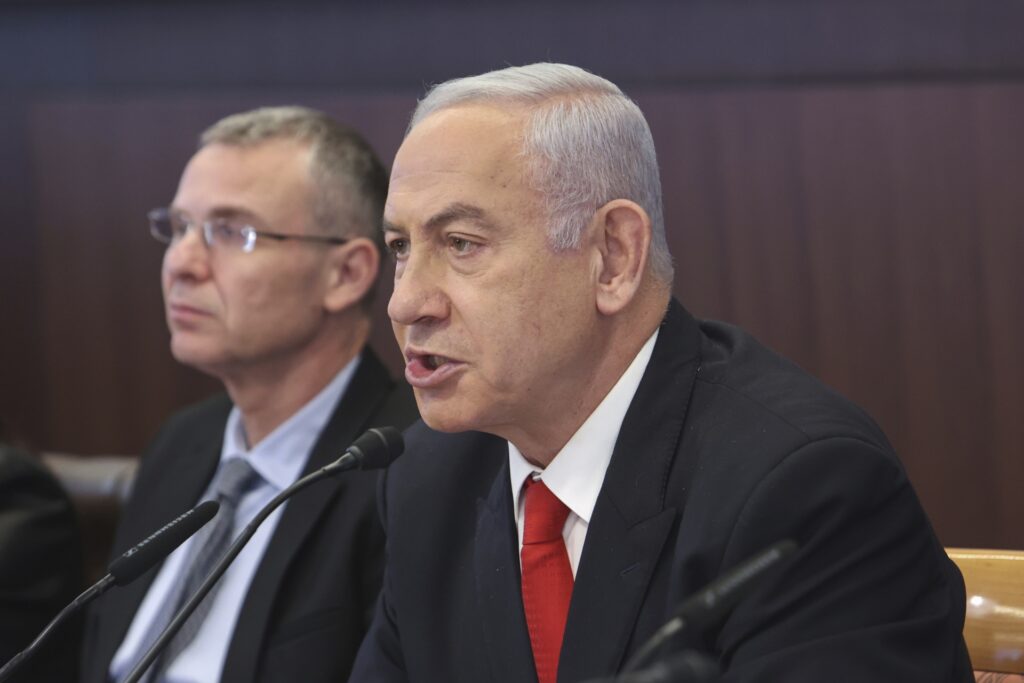The unrest in Israel is a “revolt” by “elites who want to maintain their control over the country,” according to conservative American-Israeli columnist Caroline Glick who lauded the “tactical retreat” of Israeli Prime Minister Benjamin Netanyahu after he declared pausing the judicial reform legislation to allow for negotiation amid large public protests.
Speaking with Breitbart News on Monday, Glick shed light on just how Israel arrived at its current situation.
“We’re suffering from a problem that Americans have become familiar with, which is that the left in Israel has just had it with representative democracy, and that they want to rule through the institutions that they control in Israel: the Supreme Court, the General Staff of the Army and the media,” she said.
Glick attributes the situation to a “revolt” of these elites who seek control through those institutions under their control.
“[The elites] incited the left, and they demonized the government, and they demonized Israelis who vote for right-wing parties in a way that we’ve really never seen before,” she said. “And that’s why the hatred that we’ve been seeing expressed by leftists and the outright rejection of our democratic norms has been so intense and violent.”

Israelis opposed to Prime Minister Benjamin Netanyahu’s judicial overhaul plan set up bonfires and block a highway during a protest moments after the Israeli leader fired his defense minister, in Tel Aviv, Israel, Sunday, March 26, 2023. (AP Photo/Oren Ziv)
Addressing Netanyahu’s announcement Monday of pausing the judicial reforms in order to calm tensions, Glick admitted that everyone, “including the Prime Minister himself, had a real dilemma” about how to handle the situation.
“On the one hand, any delay [of the judicial reforms] meant that we were conceding authority to the mob. But on the other hand, I think that [PM Netanyahu] viewed it, and I certainly do, as a tactical retreat in order to regroup, calm things down; hopefully, get people to realize just how over the top things have become, and to step back from the brink,” she said.
Glick explained that, in the process, “a lot of people have crossed a lot of red lines.”

Israelis opposed to Prime Minister Benjamin Netanyahu’s judicial overhaul plan block a highway during a protest moments after the Israeli leader fired his defense minister, in Tel Aviv, Israel, Sunday, March 26, 2023. (AP Photo/Oren Ziv)
“We’ve had former prime ministers taking actions that I think are inarguably treasonous: going to foreign countries and telling them to boycott the government of Israel — we’ve never seen things like this before. Generals, the former chief of staff of the army calling for people not to serve [their mandatory military duty in the IDF],” she said.
“These are felonies,” she added, “not to mention that it’s calling for a rebellion; we never saw anything like that before.”
However, Glick explained the need to lower tensions:
“We need to calm things down because if we had passed the reform today, it would have been written in water. It would have been overturned by an out-of-control Supreme Court that has right now unlimited powers. And there’s judicial reform which tried to bring them from the level of oligarchy, back into the game of democracy. Where a democratic system [exists], where all three branches of government are co-equal and check and balance one another’s powers, which is the way things used to be in Israel but have ceased to be that way today.”

Israeli police use a water cannon to disperse demonstrators blocking a highway during a protest in Tel Aviv, Israel, Monday, March 27, 2023. (AP Photo/Oren Ziv)
The problem going forward, Glick argued, is that “a government and leader, no matter how talented he is, only has a certain amount of bandwidth when the country is being engulfed by riots [and] a general strike — which is illegal but the judges side with the people who are breaking the law.”
But under such circumstances, she added, “you can’t take care of other very acute issues and we have [plenty].”
Glick explained the context of current tensions as Iran nears posing an existential threat to the Jewish state.
“Netanyahu for the past 30 years as the head of the Likud Party and as on-again off-again prime minister for the better part of the past 30 years, has made blocking Iran from getting nuclear weapons the most important priority of his political life – and Iran is a near nuclear power now,” she said.
WATCH: H. R. McMaster: Chances ‘Quite High’ of Middle East Conflict Including Israeli Strike on Iran:
“And America’s Chairman of the Joint Chiefs of Staff Mark Milley said last week that the United States will not accept a ‘fielded nuclear missile’ — a nuclear weapon by Iran — which means that they will accept a nuclear Iran; which means that Israel is alone; which means that we have to act now,” she added.
However, she noted, “you can’t take action against Iran when your country is in open revolt,” explaining that that was “the other reason why it was absolutely vital to calm things down.”
“I think we have to take care of Iran and its nuclear weapons program, and we have to be able to focus [our] energies on that,” she said. “I think that if we’re able to do that successfully, then we’ll be able to restore a lot of our diplomatic standing that has been harmed by the last ten weeks of rioting.”

Israeli Prime Minister Benjamin Netanyahu, right, chairs the weekly cabinet meeting at the Prime Minister’s office in Jerusalem, Sunday March 5, 2023. (Gil Cohen-Magen/Pool via AP)
“And I think that the government itself will be in a much better position politically to continue on with the judicial reform process, which was the deciding issue of the November 1st election,” she added.
Glick concluded by stressing that Israel has more to contend with in the near future, something impossible to do “when the country is on fire.”
On Monday, Israeli Prime Minister Benjamin Netanyahu declared in a national address that he was halting his judicial reform legislation to allow for negotiation, though vowing that reform would pass in one way or another.
Glick described the speech as “historic.”
The Israeli prime minister’s decision to halt the reforms came a day after he fired Minister of Defense Yoav Gallant, who had given an unauthorized speech opposing the reforms, citing the desertions of left-wing military reservists.
The Israeli judiciary, which has become increasingly powerful in recent decades, currently operates without functional checks and balances, as Israeli judges are selected by a commission largely composed of judges and lawyers.
Critics claim the process produces ideological conformity, allowing the secular elite to entrench judicial power.
Netanyahu’s legislation increases the power of the legislature relative to the judicial branch in order to bring into balance the three branches of government.
The proposal would reflect the process in the United States and several other democracies, in which judges would be approved by democratically elected representatives, in the hope of increasing their diversity.
Follow Joshua Klein on Twitter @JoshuaKlein.


COMMENTS
Please let us know if you're having issues with commenting.